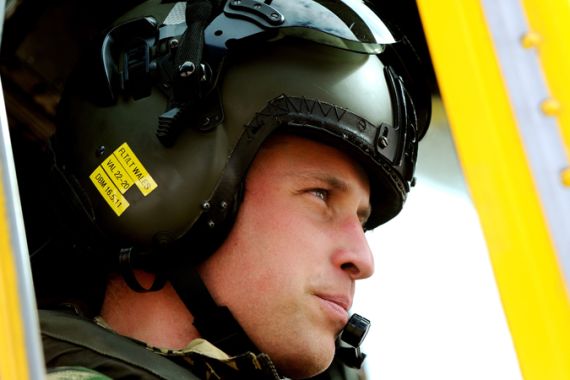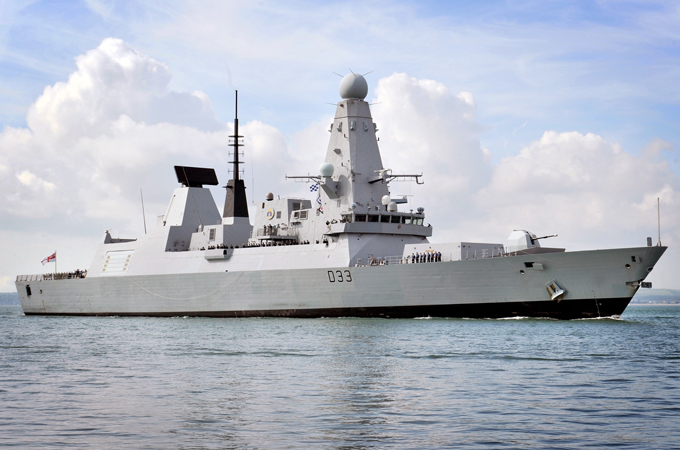Falklands crisis: Prince, navy, nationalism
Argentina worried about “militarisation” of conflict with “colonialist” UK in intensifying war of words over islands.

 |
| HMS Dauntless ‘can shoot down Argentine fighters as soon as they take off’, an official is reported to have said [AFP] |
There is something amusing – and just plain strange – about hearing the UK’s prime minister accuse Argentina of taking a “colonialist” attitude over the disputed Falkland/Malvinas islands.
The sun has, of course, set on the British Empire’s extensive colonies, but that hasn’t stopped David Cameron, and his Argentinian counterpart, from ratcheting up the nationalist rhetoric.
“In the 21st century, [Britain] continues to be a crude colonial power in decline,” Argentina’s President Cristina Kirchner said recently, branding Prime Minister David Cameron’s allegations of Argentinian colonialism an expression of “mediocrity and stupidity”.
Formally considered an overseas dependency of Britain, the Falklands – a set of islands known to Argentines as Islas Malvinas – are about the size of the US state of Connecticut with a population of 3,000 and an economy worth some $170m per year.
Most of the islands’ population reportedly wants to remain part of Britain, though Argentina says residents were placed there by the UK when it re-established its claim to the islands, 480km off Argentina’s south Atlantic coast, in 1832-33.
High stakes
With a UK-based firm exploring for petroleum in waters off the islands, and Argentines still smarting from their defeat in the 1982 Falklands war, the stakes are getting bizarrely high.
“They [Argentina’s government] may just feel that national pride demands a ratcheting up of action,” Lawrence Freedman, professor of war studies at King’s College in London, told Al Jazeera. “You can get into dangerous territory,” he said, but conceded that the possibility of another war was remote.
|
|
As if purposefully playing on colonial imagery worthy of the 19th century, rather than the 21st, Britain announced that the Duke of Cambridge – otherwise known as Prince William – recently arrived on the islands to work as a search-and-rescue pilot with the Royal Air Force.
Argentina’s foreign ministry condemned the move as a “provocation” saying the prince would be arriving “in the uniform of the conquistador”. The UK government denied any connection between the prince’s visit and recent tensions.
This isn’t the first time Britain’s royal family has been so closely involved with the islands. Prince Andrew, the Duke of York, served as a naval helicopter co-pilot during the 1982 war, taking part in anti-submarine warfare and missile decoy operations, among others.
This year marks the 30th anniversary of Argentina’s forces being routed, after the country’s former military government sent poorly trained conscripts to invade the island.
The 74 days of fighting, ending when Argentina surrendered in June 1982, claimed the lives of three islanders, 648 Argentine military personnel and 255 British troops.
Stephen Badsey, a professor at the University of Wolverhampton who studies the Falklands war, said he was shocked by the “ineptness of the Argentinian military in miscalculating the British response”.
Domestic concerns
The actions of Argentinian’s military junta, however, could have been linked more to domestic politics than to any real desire to control the islands. Three days before the invasion, Argentina’s labour unions had planned a mass demonstration against the dictatorship.
The current sabre rattling from politicians carries the same hallmarks of nationalist rhetoric amid tough economic circumstances which precipitated the 1982 conflict.
“The Malvinas/Falklands dispute provides a way of uniting nations that are politically divided,” said Carolina Acosta-Alzuru, a professor of public relations at the University of Georgia. This idea of war, distracting people from pressing domestic policies and even changing “some budgetary agendas” is not unique to the Falklands, she said.
“I don’t think there’s [ever] a conflict or war that isn’t related to domestic politics.”
While Argentina was ruled by a violent junta, which wanted to deflect popular attention from its human rights record, the UK faced its own problems in 1982, as strikes gripped the country.
Today, Argentinian leaders believe the same dynamic is occurring. The UK’s moves are linked to “British domestic politics, with high unemployment”, Amado Boudou, Argentina’s vice-president, said on Thursday. “This is an attempt to cover for a government that has a low level of accomplishment.”
|
The 1982 Falklands war was like ‘two bald men fighting over a comb’ – Jorge Luis Borges, Argentinian poet |
Britain’s Royal Navy is sending one of its most powerful warships, the HMS Dauntless – armed with 48 Sea Viper missiles – to the Falklands, in what Argentinian officials believe to be a militarisation of the war of words.
“It can shoot down Argentine fighters as soon as they take off from their bases,” a UK navy source told the conservative-leaning Telegraph newspaper. “This will give Buenos Aires serious pause for thought.”
In the past week, protesters in the Argentine capital have spray painted British banks and other multinational companies, including HSBC.
Oil and nationalism
Oil is often cited as the economic underpin inspiring conflict. On February 1, Borders & Southern Petroleum announced that it had started a 45-day exploratory process in the waters off the islands.
But some analysts believe nationalism, not undiscovered oil, is the main issue.
“One of the mistakes made in 1982 … was the belief by some members of the US State Department that the conflict could not really be about issues of international law and sovereignty, and that the oil issue must play a significant part in it,” Badsey told Al Jazeera.
“This misperception by the United States may have played a part in the failure of their attempts to resolve the conflict before major combat operations began. It is to be hoped and expected that no-one will make this mistake a second time.”
|
|
Jorge Luis Borges, an Argentinian poet, described the Falklands war as “a fight between two bald men over a comb”. The Falklands/Malvinas are home to just more than 3,000 people – but at least 150,000 pairs of Magellanic penguins. King, Gentoo, Macaroni and Rockhopper penguins also thrive on the islands’ rocky coastlines.
Following the 1982 war, the issue swiftly fell off the international diplomatic agenda. In fact, British citizens do not need a visa to enter Argentina, while citizens of other western countries – including the US and Canada – need to apply in advance.
This quiet rapprochement began unravelling in 2007, however, on the 25th anniversary of the war – when Argentina officially reasserted its claim to the islands.
Economic conflict
This time, analysts say, Argentina is likely to use its strengthened diplomatic position in an integrated, democratic South America to push its case, along with economic pressure, rather than military force.
“As to the balance of power, the UK is still more powerful than Argentina,” Acosta-Alzuru told Al Jazeera. “What has changed is the political shape of Latin America. This is why President Cristina Kirchner is organising something that resembles an economic blockade of the islands.”
In December 2011, countries from the Mercosur trading block, including Brazil, Argentina and Uruguay, agreed to close their ports to ships flying the Falklands flag. The British foreign office said it was “very concerned” by the move.
Chile’s LAN airlines, which operates the only weekly flight between the islands and the South American mainland, is apparently also coming under pressure to end the route. Argentina has allegedly been threatening to change landing rights for LAN, or perhaps even bar the Falklands/Malvinas flight from its airspace, if the airline doesn’t cancel the route.
The only other flight to the islands is run by the military, departing twice weekly from London.
Argentina is calling for the islands to “be transferred back to Argentina”, Freedman said. The British didn’t accept that in 1982, and it’s doubtful they would agree today, he said – especially not with their pilot prince heading to the island, flanked by battleships.
The chances of another armed conflict remain seemingly distant, but the deployment of military vehicles into the region, and increasing domestic pressure in both countries, has some observers worried.
“The UN has tried to mediate before,” Freedman said. “At the moment, I don’t know what is going to happen.”
Follow Chris Arsenault On Twitter: @AJEchris